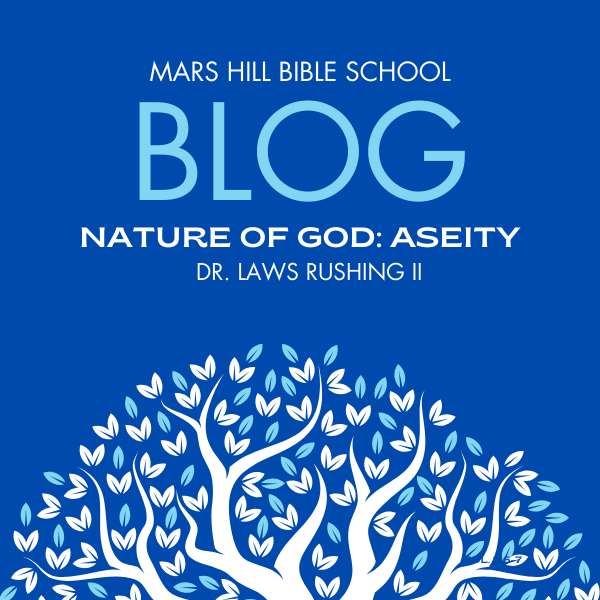MHBS Blog
Nature of God: Aseity

The persistent question of life is why is there something rather than nothing? It is an intriguing thought because for something to now exist, something has always had to exist. It is because being does not come from non-being. There must be necessary and sufficient conditions or adequate causation for the existence of anything.
Our experience with creation is with contingent being. In other words, things that don’t necessarily exist and are dependent on other events or entities for existence. Philosophers have long seen the ontological problem of an infinite regress. If the universe had an infinite past, we would never arrive at the present moment within our material universe. This is why some of the greatest thinkers rationally concluded that there must be an “unmoved mover” or a cause outside of the spatiotemporal reality.
Thomas Aquinas developed these ideas in his famous “5 ways” with the first three arguments for God’s existence which were essentially the “cosmological argument” in different forms. Aquinas argues from motion, causation, and contingency that God exists based on the fact of a finite past and therefore a transcendent Cause separate from space, time, and matter. The argument has recently been articulated as follows, “Everything that begins to exist has a cause. The universe began to exist; therefore, the universe has a cause.”
Modern developments in cosmology such as Einstein’s general theory of relativity, cosmic microwave background radiation, and the expansion of the universe- all point to a beginning to the universe. So, if the universe has not always existed, what could have existed distinctly from space, time, and matter?
The Bible succinctly gives the answer in the simplest of terms, “In the beginning God created the heavens and the earth.”
God is the transcendent cause of the universe and stands outside of space, time, and matter. He is not bound or limited by it and thus eternal in nature. God’s eternal nature means that His essence and existence are synonymous unlike the contingent universe and everything in it. The word aseity literally means “of oneself.”
God is self-existent and necessary by His own very nature. The distinction of God’s self-existent nature as the “one true living God” contrasts with the material universe or many, which is created, contingent, and caused. The mistake of the pagan cultures was to place created particulars or many in the place of the one uncreated Creator. (Romans 1: 25) “who exchanged the truth of God for the lie, and worshiped and served the creature rather than the Creator, who is blessed forever. “
An eternal God or uncaused Cause resolves the philosophical problem and pseudoscience of an infinite regress in time. Also, if God is the source of being itself, God is thus sovereign over all being, immutable, unlimited in power, knowledge, and perfection. God’s aseity is the fulcrum of His perfection and other attributes.
It is through God’s perfection that we can also commence to know Him. The 11th century theologian Anselm defined God as that “which nothing greater can be conceived.” Within our reality, there must be a maximally great entity which is the greatest of all goodness, beauty, and being itself. This is what we call God. If the greatest of all beings can be conceived and yet not exist, this idea of God is less than the greatest.
Anselm concluded that even our idea of God gives warrant for His existence because to conceive of God without existence is a logical contradiction. It is because God’s very essence is existence and necessity by virtue of His “nothing greater can be conceived.” So, “the fool has said in his heart there is no God” because atheism is an irrational thought like a square circle or married bachelor (Psalms 14:1).
The Bible speaks of God’s aseity and eternal nature. Moses encountered the Eternal in the burning bush when God declared His name. (Exodus 3: 13,14) “Then Moses said to God, “Indeed, when I come to the children of Israel and say to them, ‘The God of your fathers has sent me to you,’ and they say to me, ‘What is His name?’ what shall I say to them?” And God said to Moses, “I AM WHO I AM.” And He said, “Thus you shall say to the children of Israel, ‘I AM has sent me to you.”
The Psalmist sings, “Before the mountains were brought forth, Or ever You had formed the earth and the world, Even from everlasting to everlasting, You are God” (Psalms 90:2). Moreover, Thomas Aquinas explained, “eternity is nothing but God Himself. Hence God is not called eternal, as if He were in any way measured; but the idea of measurement is there taken according to the apprehension of our minds alone.” (Aquinas 2003) We owe our very being to God. The Apostle Paul commends the Athenian poets by quoting, “For in him we live, and move, and have our being” (Acts 17:28).


.png)
